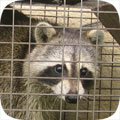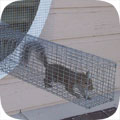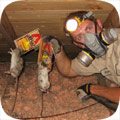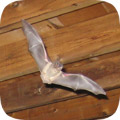- dover@wildlifeanimalcontrol.com
Call 24/7 for a free quote:
302-246-5563
Dover Wildlife Animal Control
Professional Wildlife Removal Company Servicing Dover, DE
If you have a problem with wildlife in your Dover home, your best option is to hire a company that specializes in Delaware wildlife removal only. This is a specialty business, and regular pest control companies do not use the proper techniques to solve animal problems. I have spent many years reviewing Delaware and Dover, and I recommend the following:
Wildlife Removal Delaware
Cell Phone: 302-246-5563
NOTE: If you have a dog or cat problem, call Kent County Animal Services: 302-736-7111

Wildlife Removal Delaware specializes primarily in removing animals from attics of homes and buildings - this includes squirrels in attics, raccoons, and rats or mice in homes. Delaware also has a documented problem with
bats in buildings, and Wildlife Removal Delaware is specially trained in bat removal. They also perform general wildlife trapping services, such as the capture and removal of skunks or opossums on the
property. Call 302-246-5563 to discuss your critter problem and schedule a same-day or next-day appointment. Click here to learn more about
what prices we charge in 2022.
When hiring a company to solve your wild animal problem, you want these features:
- Specializes in wildlife removal, not pest control
- Fully Delaware and Kent County licensed and insured
- Works 7 days per week (critters don't take weekends off)
- Performs full building inspections: enters and inspects attic
- Performs exclusion repairs, with guarantee against animal re-entry
- Offers cleanup of biohazardous wildlife waste
Wildlife Removal Delaware is a full-service Dover wildlife removal company. This is very different from a regular Dover pest control company. The pest control companies spray poison to kill insects. This is not at all
similar to wildlife removal. Wildlife Removal Delaware performs a full inspection of the home or property, and determines why the animal(s) are there, and if inside a building, how the animals got inside. All
animals (including rodents) are trapped and removed, or if possible, removed from the building using special exclusion devices. Once the animals are gone, preventative repairs are essential, and
cleanup is sometimes recommended.
 Dover wildlife trapping - it's not as simple as it may seem. It's illegal in Delaware to trap without a license. Trap type is very important and there are many different types, bait is somewhat relevant, trap placement
is vital, and there are dozens of small things that are very important to know.
Safety is a concern. Then once the animal is trapped, it must be removed and dealt with in the proper manner according to Delaware law. We offer Dover raccoon removal. Read more about how to get rid of raccoons.
Dover wildlife trapping - it's not as simple as it may seem. It's illegal in Delaware to trap without a license. Trap type is very important and there are many different types, bait is somewhat relevant, trap placement
is vital, and there are dozens of small things that are very important to know.
Safety is a concern. Then once the animal is trapped, it must be removed and dealt with in the proper manner according to Delaware law. We offer Dover raccoon removal. Read more about how to get rid of raccoons.
 Animals in attics - this is our specialty at Wildlife Removal Delaware. Many types of animals like to live in attics. This includes squirrels, raccoons, rats, mice, bats, birds, and even possums. Critters like to go into attics for a safe place to live
and raise their young. Removing animals from attics is very complex work, partly because of the presence of baby animals. If you need Dover squirrel removal, we can remove all the squirrels from your attic, and seal out any future ones. Read more about how to get rid of squirrels.
Animals in attics - this is our specialty at Wildlife Removal Delaware. Many types of animals like to live in attics. This includes squirrels, raccoons, rats, mice, bats, birds, and even possums. Critters like to go into attics for a safe place to live
and raise their young. Removing animals from attics is very complex work, partly because of the presence of baby animals. If you need Dover squirrel removal, we can remove all the squirrels from your attic, and seal out any future ones. Read more about how to get rid of squirrels.
 Rodent control must be done in a very specific way. First off, the most important thing is that all the openings that rats and mice can use to enter a house be sealed. Then all the rodents must be physically trapped and removed.
Never, ever use poison! Most Dover exterminators will just use this lazy poison technique to kill rodents, and it causes more harm than good - dead stinky rats, and it doesn't solve the problem. Call us for correct Dover rat removal. Read more about how to get rid of rats.
Rodent control must be done in a very specific way. First off, the most important thing is that all the openings that rats and mice can use to enter a house be sealed. Then all the rodents must be physically trapped and removed.
Never, ever use poison! Most Dover exterminators will just use this lazy poison technique to kill rodents, and it causes more harm than good - dead stinky rats, and it doesn't solve the problem. Call us for correct Dover rat removal. Read more about how to get rid of rats.
 Bat removal is a highly specialized task. Delaware is known to have colonizing bats who often live in buildings. Bats love attics. If not removed, the colony can grow to a very large size over the years. The bat droppings are often corrosive and
cause health risks. The same goes for bird droppings on or in buildings. We perform Dover pigeon removal and bird control. But our specialty is Dover bat removal. We remove 100% of the bat colony and seal the building so that it's totally bat-proof. Read more about how to get rid of bats.
Bat removal is a highly specialized task. Delaware is known to have colonizing bats who often live in buildings. Bats love attics. If not removed, the colony can grow to a very large size over the years. The bat droppings are often corrosive and
cause health risks. The same goes for bird droppings on or in buildings. We perform Dover pigeon removal and bird control. But our specialty is Dover bat removal. We remove 100% of the bat colony and seal the building so that it's totally bat-proof. Read more about how to get rid of bats.
 If you have animals inside a house, no job is complete without proper exclusion repairs. If you simply hire a Dover trapper who only removes the critters, then the problem will return. You need to hire a Dover wildlife control company that identifies 100% of the animal entry points
into your building, and seals them shut with professional repairs. In addition, in many cases animals have left waste or contamination behind, and you'll want a company that can provide professional cleaning services. Wildlife Removal Delaware does both.
If you have animals inside a house, no job is complete without proper exclusion repairs. If you simply hire a Dover trapper who only removes the critters, then the problem will return. You need to hire a Dover wildlife control company that identifies 100% of the animal entry points
into your building, and seals them shut with professional repairs. In addition, in many cases animals have left waste or contamination behind, and you'll want a company that can provide professional cleaning services. Wildlife Removal Delaware does both.
The above are just some of the services offered by Wildlife Removal Delaware. We also trap and remove animals that destroy lawns, such as moles, or digging animals. Sometimes animals like opossums will live under buildings, steal pet food, raid garbage cans, etc.
Read about how to get rid of opossums. Skunks commonly live under sheds or decks, and set up a den. We can trap and remove them without them spraying. Read about how to get rid of skunks. Wildlife Removal Delaware
also provides dead animal removal in Dover. If you need help with any other wildlife conflict, from a fox, beaver, groundhog, or any other critter, we can solve it. We also do Dover snake removal - most of the snakes in Delaware are not venomous, but
call us if you want safe removal, or read about how to get rid of snakes in Dover. And remember, we are a private business, not Kent County Animal Control Services, so if you have a dog or cat problem, call the County at 302-736-7111.
Kent County animal services does not handle any wildlife issues.
Wildlife Removal Delaware: 302-246-5563
Dover Pricing Info For Year 2022
 Every wildlife removal situation is different, from the species of animals involved, the location of the animal inside a house or outside, the extent of repairs or cleanup, etc. It's impossible to give one-size-fits-all prices. Examples MIGHT include:
Every wildlife removal situation is different, from the species of animals involved, the location of the animal inside a house or outside, the extent of repairs or cleanup, etc. It's impossible to give one-size-fits-all prices. Examples MIGHT include:
Small Job: For example, a one-stop job to remove an animal in the yard: $100 on up
Medium Job: For example, getting critters out of your house with minor repairs: $300 on up
Large Job: For example, a project involving many service trips and complex work: $500 on up
Give us a phone call now and tell us about your wildlife issue and we will be able to give you a price estimate over the phone. If you're cool with it, we can schedule a same-day or next-day appointment if you like. Our prices are fair, and a good value because we do the job right, the first time.
Dover Wildlife Tip #1:
WHAT PROBLEMS DO MONKEYS CAUSE FOR PEOPLE?
Most people are animal lovers and are keen to have pets in the house. While most people choose to adopt cats or dogs, or keep animals such as fish, hamsters, rabbits or even a goat, there are some on the most eccentric side that choose exotic, yet seemingly harmless animals to have as pets.
One of the most popular exotic pets are monkeys. Monkeys are extremely cute and friendly, and they look and act like humans a lot more than other species do. This makes them very attractive as pets to some people who decide to raise them in the house and try to domesticate them.
But monkeys are not meant to be pets. Though they have shown to develop emotional bonds with humans, they are in fact wild animals that should live undisturbed in their natural habitat. This precaution is not only in favor of the monkey, but also of humans.
Monkeys can live anywhere between 20-40 years, this means a long-term commitment to caring for an animal that will need constant dedication and supervision. They easily get emotionally attached to their care-giver so new family members are not always welcome, and separation due to adoption and cause severe anxiety to the little monkey. They are highly intelligent creatures, and can act like a perpetual toddler, this means that they can lash out with violent and rebellious behavior when faced with situations that they do not like or understand.
Whether you are thinking of a pet monkey, or live in an area close to wild primate habitat, there are many health and safety issues to consider. Monkeys can easily pass on a wide variety of diseases to other monkeys or to humans, like yellow fever or malaria. It is important to determine where the monkey comes from and what diseases it's sub-species is susceptible to. Monkey from South and Central America are more resistant to most diseases than Monkey from the "old world" continents, such as African or Indian monkeys, because they have evolved differently over millions of years. Knowing as much as you can about your pet monkey or the monkeys that live near you will help you prevent certain diseases.
But apart from being potential disease carriers, monkeys can also be a danger to humans due to their violent nature. Baby monkeys are very cute and cuddly and can appear to be docile because they are dependent infants, but that doesn't mean that they will stay this way all their lives. Monkey are meant to be wild animals, and growing up around humans, deprived of the natural interactions and socialization with other monkeys can cause you pet to develop violent and nervous behaviors that can eventually cause it to attack the humans that it lives with. Wild monkeys that live very close to human population have also been known to invade and violently attack human towns and homes in search of food or in the attempt to protect their homes and families from what they see (and rightly so) as threats to their natural habitat.
Dover Wildlife Tip #2:
Delaware Wildlife Information:
Delaware has about 800 different species of wildlife and in 2015 the U.S. Fish and Wildlife Service approved an action plan created by the state to protect local fish and animal species with conservation efforts. Not only do animals receive direct care, their natural habitat is conserved for future generations.
You can always call Wildlife Removal Delaware, any time of day, at 302-246-5563, for a price quote for Dover wildlife control services. I am confident that this is the best choice amongst wildlife removal companies in Dover, DE.





































